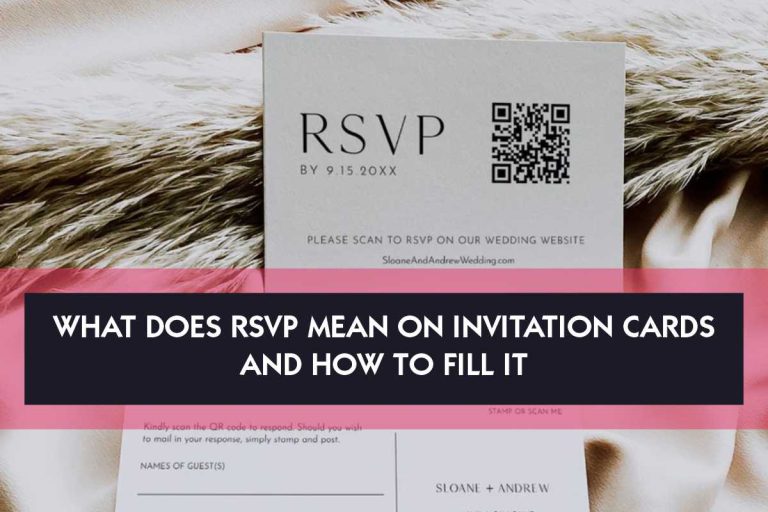It’s the most wonderful time of the year – wedding season! There’s nothing quite like the excitement of receiving a beautiful wedding invitation in the mail. Not only is it a sign of love and commitment between two people, but it’s also an opportunity for guests to celebrate with the happy couple on their big day. Wedding invitations serve as a vital form of communication between the couple and their guests, providing all the necessary information for the wedding day. However, there’s one crucial element that’s often overlooked, and that’s the RSVP. It’s a little acronym that carries a lot of weight, and it plays a significant role in ensuring that the big day runs smoothly.
On wedding invitations, you may come across the acronym RSVP, which is essential as it helps the host to plan and organize the event efficiently. It also shows the level of formality and respect the host expects from the guests. However, RSVP etiquette differs across cultures, and in Nigeria, it holds particular significance. In this article, we will delve deeper into what RSVP means on invitation cards in Nigeria, its importance, and the cultural differences surrounding it.
Table of Contents
ToggleSo, What Does RSVP Mean Exactly?
RSVP is a term commonly seen on invitation cards, which stands for “Répondez s’il vous plaît”, a French phrase that translates to “Please respond” in English. It is an essential part of formal event planning, as it helps the host to determine the exact number of guests who will attend the event, thereby making preparations for the event more accurate and efficient.
When you get an invitation that says RSVP, it means you need to let the couple, event coordinator, wedding planner, or whoever invited you know if you’re going to be at the event or not. It’s important to respond before the date they give you, so they can plan everything accordingly.
Responding to a wedding RSVP is not just about letting them know if you’re going or not, but they also need to know how many people are coming in total. So if you’re bringing a guest, you need to let them know that too.
The historical origin of RSVP dates back to the French aristocracy in the 18th century, where the use of RSVP was a formal etiquette used to request the response of invited guests, indicating their attendance or absence at an event. Over time, the practice of RSVP has become a standard practice in event planning and is now used globally in formal events.
In Nigeria, RSVP is essential in formal events and is considered a cultural norm that reflects respect and courtesy towards the host. It is common practice to include RSVP on invitation cards for events such as weddings, corporate events, and other formal gatherings. The cultural significance of RSVP in Nigeria lies in the importance of acknowledging the invitation and showing respect to the host by responding appropriately.
In addition, RSVP helps the host plan and prepare for the event more accurately, ensuring that the guests are properly catered to. It also helps to prevent any unnecessary inconvenience that may arise from not having an exact number of guests, such as over or underestimating the amount of food, drinks, or other resources needed for the event.
Therefore, guests are encouraged to respond to RSVPs through the provided medium in the invitation (phone, online form, or email) in a timely and appropriate manner, as it is an important part of the event planning process.
Want To Print Something?
So, How Do RSVP Cards Work?
RSVP cards are a key part of the wedding invitation process. They help you keep track of who is coming to your big day, and they also give your guests a way to let you know if they can’t make it and who they are coming with (a plus one).
So, how do RSVP cards work? Here’s a quick overview:
- The RSVP card is sent out with the wedding invitation.
- Guests fill out the RSVP card and return it to the host.
- The host uses the information on the RSVP card to plan for the big day.
- If a guest can’t make it, they may send a regretful decline letter instead of an RSVP card.
- The RSVP card should also have an area where the guests can fill out their mailing addresses. This is so that you can send them a thank you card after the wedding.
That’s all there is to it! RSVP cards are a simple but important part of the wedding planning process. Make sure you send them out early and give your guests plenty of time to fill them out and return them to you.
If you’re invited to a wedding, please make every effort to respond as quickly as possible – even if you’re not sure whether you’ll be able to attend. If something comes up and you can’t make it, let the bride and groom know as soon as possible. That way, they won’t be left scrambling to fill seats at the last minute.
Importance of RSVP on Invitation Cards in Nigeria
RSVP (Répondez s’il vous plaît) is an important aspect of invitation cards in Nigeria. It is considered essential because it helps the host to plan and organize the event in a better way. RSVP is a cultural norm in Nigeria and not responding to an invitation can be considered as impolite and disrespectful.
In Nigeria, it’s customary to respond to an invitation, whether you will be attending or not. RSVP helps the host to get an accurate count of the number of guests who will be attending the event. This information is crucial for the host to make adequate preparations such as catering, seating arrangements, and accommodation for guests who are coming from out of town.
Moreover, in Nigerian culture, hospitality is a significant aspect of social life, and hosts go to great lengths to ensure that their guests are comfortable and well taken care of. When guests do not respond to the RSVP on an invitation card, it is perceived as disrespect and disregard for the host.
Benefits of RSVP for Weddings and Other Event Planning
The benefits of RSVP for event planning and organization are numerous. Below are some of them.
- Efficient Planning and Organization: RSVP enables the host to plan and organize the event efficiently. This means that they can make adequate arrangements for seating, food, drinks, and entertainment.
- Accountability: It allows the host to have a precise count of the number of guests attending the event, which enables them to manage their budget effectively. It also helps the host to avoid wastage of resources by ensuring that there is no excess food or drinks that will go to waste.
- Manage Expectations: RSVP helps the host manage expectations by giving them a clear idea of what to expect at the event. By responding to the invitation, guests can also inform the host of any special dietary requirements or preferences they may have, which can be accommodated accordingly.
- It Reflects Respect: RSVPing and responding to RSVP when invited to an event reflects respect towards the host and helps to maintain good relationships. Failure to RSVP is seen as discourteous, and it may affect the guest’s relationship with the host. As a result, it is essential to include RSVPs on the invitation cards to ensure that guests respond appropriately.
- Create a Positive Image: RSVP on invitation cards also helps to create a positive image for the host. Guests are more likely to attend an event that is well-planned and organized, and this can be achieved through the use of RSVP. It shows that the host is attentive to details and cares about their guests’ comfort and enjoyment.
Common Alternative Words For RSVP on Invitation Cards
Some couple believes RSVP is too cliche, so they tend to use more unique words and phrases. So, it’s important to know that when responding to an invitation, there are some other words and phrases that are often used as an alternative to RSVP on invitation cards. Understanding what these phrases mean can help you as a guest to respond appropriately.
Below are 7 of the common alternative phrases used for RSVP cards and their meanings:
Want To Print Something?
- RSVP: This phrase stands for “Répondez s’il vous plaît,” which is a French phrase that translates to “please respond.” This means that the host is requesting a response from the guest as to whether or not they will be attending the event.
- Kindly respond by: This phrase is often followed by a date or deadline by which the guest should respond. It means that the host is requesting a response from the guest by the indicated date so that they can plan the event accordingly.
- Regrets only: This phrase is used when the host only wants to be contacted if the guest is unable to attend the event. This means that if the guest does not respond, the host assumes that they will be attending the event.
- Accepts with pleasure/Declines with regret: These phrases are used to indicate whether or not the guest will be attending the event. “Accepts with pleasure” means that the guest will be attending, while “declines with regret” means that the guest will not be attending.
- Number of persons attending: This phrase is used to indicate the number of people who will be attending the event with the guest. The guest should indicate the number of people attending so that the host can plan for the appropriate amount of food, seating, etc.
- Dietary restrictions: This phrase is used to indicate any food allergies or dietary restrictions that the guest may have. It is important for the guest to indicate any dietary restrictions so that the host can plan the menu accordingly.
- Number of Guests: If the invitation allows for additional guests, this phrase will appear on the RSVP card with a space to fill in the number of guests who will be attending with you.
It is important for guests to respond promptly and accurately to these RSVP phrases so that the host can plan and organize the event appropriately.
What Should A Wedding RSVP Include?
A typical wedding RSVP card should include the following information:
- The name of the person or family who is invited
- The number of people who will be attending (adults, children, etc.)
- Meal preferences (if applicable)
- RSVP by date
- Contact information for the person or family
- A response card with an area for guests to mark whether they will be attending or not
- The date that the RSVP is due
- Instructions on how to RSVP, such as an RSVP website, email address, or phone number
One way to increase the response rate for your Nigerian wedding is to include a response card with every invitation and not just write it on the main invitation card. A separate response card allows guests to easily RSVP and provide their contact information so that they can be reached if there are any changes to the wedding plans. If you are not able to include a response card with every invitation, another option is to set up an RSVP website or email address where guests can RSVP. You can also provide a phone number for guests to call if they have any questions about the wedding or their RSVP.
How To Respond and Fill Out An RSVP Card
When filling out an RSVP card, it is important to follow the instructions provided by the host and to be clear and concise in your response. Here are some examples of how to fill out an RSVP card:
RSVP:
Dear [Host’s Name],
thank you for inviting me to [event]. I am delighted to attend and will be sure to RSVP by the requested date. Thank you for including me in your celebration.
Warm Regards
[Insert Your Name(s)]
Regrets Only:
Dear [Host’s Name],
Thank you for inviting me to [event]. I am excited to attend and look forward to celebrating with you. However, in the event that I am not able to attend, I will be sure to let you know by the deadline provided. Thank you again for the invitation.
Warm Regards
[Insert Your Name(s)]
Accepts With Pleasure:
Dear [Host’s Name],
Thank you for inviting me to [event]. I am honored to attend and will be happy to accept with pleasure. I look forward to sharing this special occasion with you. Thank you for including me in your celebration.
Warm Regards
[Insert Your Name(s)]
Declines With Regret:
Dear [Host’s Name],
Thank you for inviting me to [event]. Unfortunately, I will not be able to attend and must decline with regret. However, I appreciate the invitation and thank you for including me in your special day.
Warm Regards
[Insert Your Name(s)]
Kindly Respond By:
Dear [Host’s Name],
Thank you for inviting me to [event]. I am looking forward to attending and will be sure to RSVP by the requested date. Thank you for inviting me to be a part of your celebration.
Warm Regards
[Insert Your Name(s)]
Number Of Guests:
Dear [Host’s Name],
Thank you for inviting me to [event]. I am delighted to attend and will be bringing [number of guests] guests with me. Thank you for including us in your celebration.
Warm Regards
[Insert Your Name(s)]
When Should RSVP Card Be Returned
The RSVP card on an invitation should be returned as soon as possible. It is important to respond in a timely manner, as it helps the event organizers to plan and make necessary arrangements. Ideally, guests should respond within a week or two after receiving the invitation. If not, then latest, a month before the wedding event. This will give the event organizers enough time to estimate the number of guests attending, plan for seating arrangements, order catering, and make other necessary arrangements.
In some cases, the invitation may specify a deadline for responding to the RSVP card, and it is important to adhere to the specified deadline. This will help to avoid any inconvenience and ensure that the event runs smoothly. It is considered polite and respectful to respond to an RSVP card promptly, whether accepting or declining the invitation.
Consequences of Not Responding to an RSVP in Nigeria
Not responding to an RSVP in Nigeria can have several consequences that affect both the couple and the invitee
Consequences of not responding to an RSVP in Nigeria:
- Difficulty in Planning and Organization: Not responding to an RSVP can make it difficult for event organizers to plan and make necessary arrangements. This can cause inconvenience and chaos for both guests and organizers.
- Wastage of Resources: Failure to respond to an RSVP can lead to a miscalculation of the number of guests attending, which can result in the waste of resources, such as food and drinks, leading to additional costs for the event organizers.
- Poor Perception: Failing to respond to an RSVP can give the impression of disinterest or rudeness, and this can be perceived negatively by the host or event organizers.
- Exclusion from Future Events: Not responding to an RSVP can also result in exclusion from future events, especially if it becomes a recurrent habit.
Impact On Event Planning and Organization:
The success of any event depends on proper planning and organization. The inability to accurately estimate the number of guests attending can lead to over or under-provision of resources, leading to additional costs and wastage. This can be detrimental to the event’s success and can affect future planning.
Social Implications and Cultural Norms:
In Nigeria, attending events and social gatherings is an important aspect of the culture, and it is considered polite to respond to an RSVP, indicating either acceptance or decline. Failure to respond to an RSVP is perceived as disrespectful and can lead to strained relationships between hosts and guests. It can also lead to a negative perception of the guest and can affect their social standing within the community.
Want To Print Something?
Frequently Asked Questions (FAQs)
Yes, you can say “I RSVP’d” when referring to your response to a wedding invitation. This is because RSVP’d is the past tense of RSVP which is an acronym for “répondez s’il vous plaît,”, and when an acronym is used in past tense an apostrophe and a “d” is added to avoid confusion on the actual pronunciation of the acronym.
The letter “M” on an RSVP card is an indication of the first letter of the receiver’s title. The M is typically followed by a blank line and is intended for the guest’s name to be written in. It could either be for Mr., Mrs., Ms., or Miss. This line is often labeled as “M__________,” where the guest can fill in their title, name, and any additional guests attending. For example Mr Dapo, Mrs Olawale, Madam Cash, etc.
No, it is not mandatory to include RSVP cards in wedding invitations. However, it is recommended to include RSVP information in some form, whether through cards, online forms, or other means, as it is essential for proper event planning and organization.
Wedding RSVPs should be sent out to guests 4-6 weeks before the wedding date. This gives guests enough time to make necessary arrangements and confirm their attendance or absence
No, you do not RSVP to a “save the date” invitation. A “save the date” is a preliminary invitation sent to guests to inform them of an upcoming event, usually a wedding or other significant occasion. It is not a formal invitation and does not require an immediate response.
While there is no exact percentage of wedding guests who RSVP, studies suggest that between 60-80% of guests are likely to RSVP to a wedding invitation. However, this figure can vary widely, depending on several factors such as the age of the guests, the type of event, the formality of the invitation, and the cultural norms. In some cultures, for instance, it is expected that all guests will RSVP, while in others, it is not customary to respond to invitations formally.




